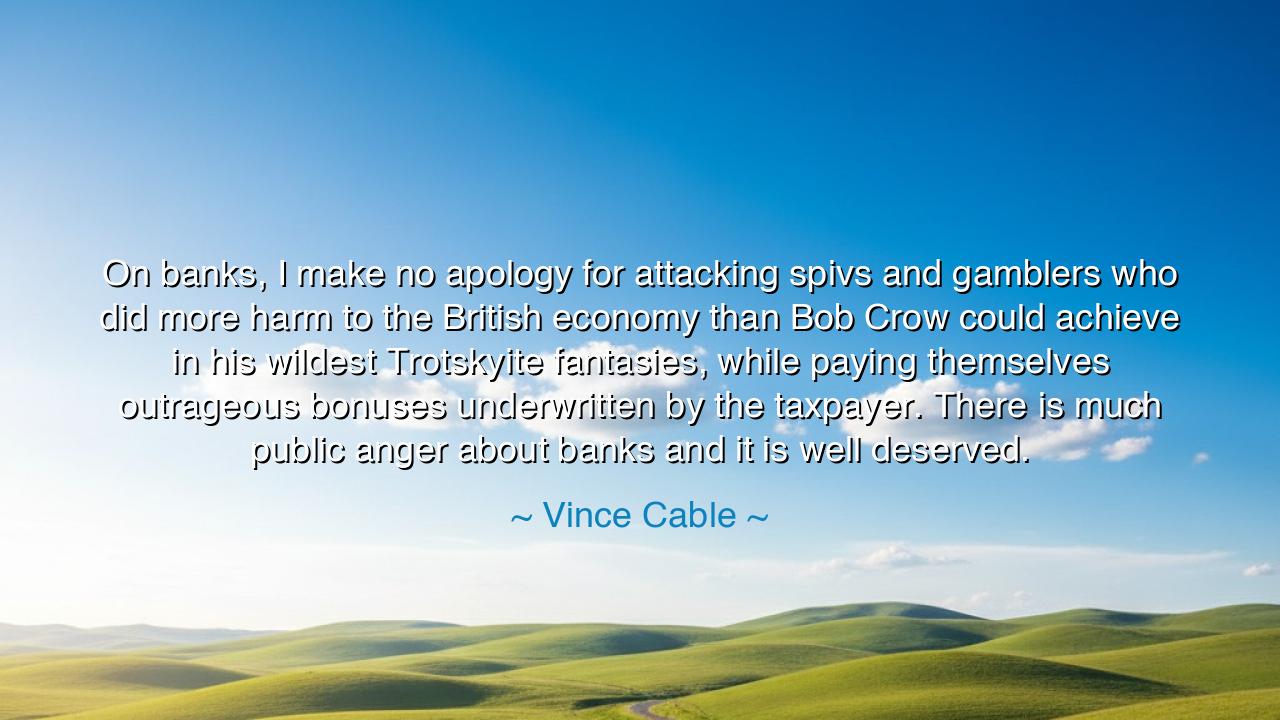
On banks, I make no apology for attacking spivs and gamblers who
On banks, I make no apology for attacking spivs and gamblers who did more harm to the British economy than Bob Crow could achieve in his wildest Trotskyite fantasies, while paying themselves outrageous bonuses underwritten by the taxpayer. There is much public anger about banks and it is well deserved.






Host: The room is quiet, the soft glow of evening light casting long shadows across the space. The city outside hums with the distant rhythm of life, but inside, the atmosphere feels charged, like a conversation is about to take shape. Jeeny sits at the table, her hands folded in front of her, her thoughts clearly turning over the weight of a recent reading. Jack stands near the window, arms crossed, watching the street below, lost in thought.
Jeeny: (her voice calm, yet filled with a quiet intensity) “You ever think about how institutions, like banks, have such a strong hold on the economy, yet their actions can hurt so many people? I was reading something Vince Cable said, and it made me think about this. He said, ‘On banks, I make no apology for attacking spivs and gamblers who did more harm to the British economy than Bob Crow could achieve in his wildest Trotskyite fantasies, while paying themselves outrageous bonuses underwritten by the taxpayer. There is much public anger about banks and it is well deserved.’”
Jack: (pauses, raising an eyebrow as he considers her words) “Attacking spivs and gamblers? He’s clearly got some strong feelings about banks. What do you think he’s getting at with that? The anger towards them, I mean?”
Jeeny: (nodding, her voice steady as she reflects on the idea) “I think what Vince Cable is pointing out is how banks have historically been allowed to make risky decisions with other people’s money—public money—while also paying themselves huge bonuses when they make profits. And when things go wrong, it’s the public that ends up paying for their mistakes. It’s like they’ve become immune to accountability, while the rest of society bears the consequences.”
Host: The room feels heavier now, the weight of her words hanging in the air like a call to action. Jack stands still, his gaze softening as he begins to process the critique of the banking system. The world outside continues, but inside, the conversation seems to be opening up something deeper about power, fairness, and accountability.
Jack: (his voice quieter now, almost reflective) “So, it’s about the disparity between what these institutions do and what they’re allowed to get away with. They’re playing with other people’s wealth and, when it blows up in their faces, they get bailed out, but the rest of us—ordinary people—suffer. Meanwhile, they still reward themselves with big bonuses.”
Jeeny: (smiling gently, her voice full of quiet conviction) “Exactly. And what’s so frustrating is that they don’t seem to face the same consequences as the rest of society. It’s a broken system, where the people who should be accountable aren’t, while everyone else has to carry the weight of their mistakes. That’s why there’s so much anger about it. People are fed up with the way banks continue to operate above the law, protected by the system, while the public picks up the tab.”
Jack: (pauses, his expression thoughtful, almost saddened) “I guess that’s the problem with a lot of institutions, isn’t it? The people at the top are insulated from the real consequences of their actions, while everyone else pays the price. It’s frustrating, because it feels like the system is rigged in their favor.”
Jeeny: (nodding, her voice calm but strong) “Exactly. And that’s why there needs to be more accountability. If the banks are going to take risks, they should do it with their own money, not ours. They should face the consequences of their actions just like anyone else. The public has a right to be angry, because it’s not just about money—it’s about fairness and trust in the system.”
Host: The air in the room seems to settle into a quiet understanding, as if the conversation has uncovered a deeper truth about the inequality built into the financial system. Jack looks out the window again, his mind clearly processing the weight of their conversation, while Jeeny watches him with the quiet satisfaction of having shared a perspective that feels both urgent and necessary.
Jack: (his voice softer, almost with a new sense of realization) “Yeah, I see it now. It’s about fairness and the sense that some people play by one set of rules while everyone else has to follow another. It’s not just about the money—it’s about how those in power get to act without being held accountable.”
Jeeny: (smiling softly, her voice gentle but full of strength) “Exactly. Until there’s real accountability, until the system works for everyone, not just the wealthy and powerful, that anger will keep growing. People have every right to demand change.”
Host: The room feels still, the weight of the conversation settling into a deeper understanding of the power structures that influence our lives. The world outside continues, but inside, Jeeny and Jack share a moment of quiet recognition. The conversation has revealed the deep inequality in the system and the need for change—a reminder that real power lies in holding institutions accountable for the impact they have on society.






AAdministratorAdministrator
Welcome, honored guests. Please leave a comment, we will respond soon